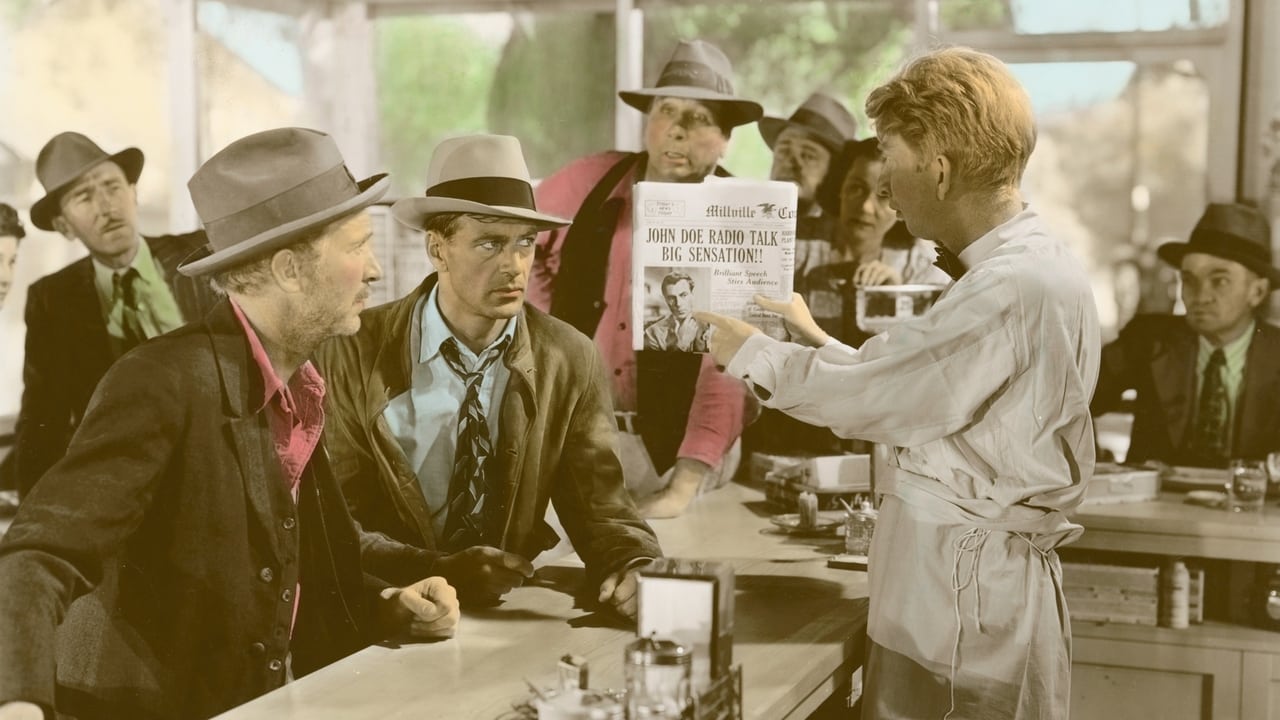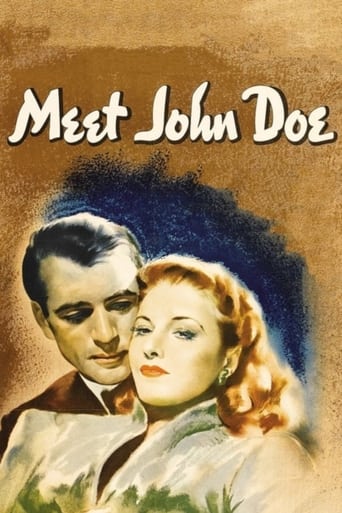

just watch it!
... View MoreThe performances transcend the film's tropes, grounding it in characters that feel more complete than this subgenre often produces.
... View MoreAlthough I seem to have had higher expectations than I thought, the movie is super entertaining.
... View MoreAfter playing with our expectations, this turns out to be a very different sort of film.
... View MoreCity hall wouldn't be my choice as where to jump off a roof on Christmas Eve. A highly guarded tower in mid Manhattan would be my choice if I was inclined to do something like that. A big wealthy blowhard proves that corruption is king, and with political ambitions decides to run for President. But it's not quite time for the Antichrist to take over, and no amount of journalistic manipulation will change that, whether it's through social media or their own newspaper. Edward Arnold is the ruthless D.B. Norton whose obsession with power causes him to take over a dying newspaper, turning it around with sensation, but underestimating the power of the people: the real people. That's where the stars of this Frank Capra classic comes in, them being fired journalist Barbara Stanwyck and jobless baseball player Gary Cooper, hired by rehired Stanwyck and editor James Gleason to represent the average American man who will fulfill Stanwyck's column to represent the man who intends to jump off the roof on Christmas eve.There's been constant discussion over this film for its message and especially over its conclusion. It's a masterpiece in many ways, certainly nor flawless, and exceptionally well acted. It's a reunion for Capra and Stanwyck, their first together in 8 years, coming at the height of her popularity, with three classics in one year, and one of two she starred in that year with Cooper. Stanwyck is feminine but tough, no namby pamby broad, ruthless in her ambitions, and yet with a strong ethical code that the promise of a ton of cash cannot buy. Cooper continues his continuation of the all American hero. Supporting the two are imperious Arnold, wise cracking Gleason, and ornery Walter Brennan, giving his all as Cooper's sidekick. Spring Byington, Regis Toomey, Sterling Holloway and Gene Lockhart are secondary players who stand out amongst the usual assortment of Capra's regular ensemble players. It dies get a bit corny at times, but there are many moments that are really truth telling and honest. It's a movie that still provides hope in a difficult time and reminds us who really is running the show. Even in the most difficult times, it will be the real people who "trump" the tyrants.
... View MoreCapra-corn. This moniker is often used for many of the films of Frank Capra. Are his films a little corny? A little too homespun? Perhaps a bit. But I see them as being a balance on the scales of Hollywood, which has a tendency -- all too often -- as painting Americans as less than admirable people. Of course, some of us Americans are less than admirable, and we see a lot of those types in movies. But some of us are a little corny and homespun. We don't see those folks in many films. So Capra and occasionally other producers and directors toss a few films on the scale to balance out our view of American life.This is a fine film, although not my favorite Capra flick; I prefer "Lost Horizon" and "It's A Wonderful Life". But this is so good. I find the early part of the film a bit slow, but the film continues to build and is ultimately quite inspirational.Gary Cooper is excellent here. As he career matured, and particularly because of "High Noon", we sometimes tend to think of Cooper as a star of Westerns. This film is a good reminder that he was in plenty of other types of dramatic films. In fact, at least for me, it was his films that were not Westerns that I tend to enjoy most. Some people jump to the conclusion that Frank Capra should have used Jimmy Stewart here. I disagree strongly, although I very much like Jimmy Stewart's work. Cooper was perfect for the role. Stewart could have done it, but it would have been that Stewart that we sometime saw as sneering that would have marked a Stewart appearance here.Barbara Stanwyck is also excellent here. In fact, I would have to say this was one of her better roles.James Gleason has the standout supporting role here. I always enjoy him, but here -- as the newspaper editor -- I think he had one of his best roles, and he really shines in the scene where he's drunk...and honest with John Doe.Edward Arnold made a fine villain. I think Walter Brennan got the short end of the stick here. He's too much an old grump in this film; I didn't find him very likable. Spring Byington is here in a small role as Stanwyck's mother; a rather typical role for her. Gene Lockhart has a significant role as a mayor, but gets little screen time. Regis Toomey doesn't have much screen time, but he has a fine role in a supporter of John Doe. J. Farrell MacDonald has a small role here as "Sourpuss", and he's a character actor we never saw enough of. Interesting that Ann Doran has a small, but significant role, but got no billing.
... View MoreA man needing money (Gary Cooper) agrees to impersonate a nonexistent person who said he would be committing suicide as a protest, and a political movement begins.What a great story of the Great Depression, community, greed, politics, the newspaper business and "helots". I especially love that even if I did not know it was Frank Capra's movie, I would still have figured it out... he just has such an optimistic worldview and a way of making the tragic seem like an opportunity...The film needs a good cleaning up. At least, the version I watched did. Somehow the film escaped Warner Brothers and made it into the public domain. Does a good version exist? Maybe. But it is far easier to find the other versions... and while they are not terrible, there is obviously some aging.
... View MoreThree Oscars and some successful films under his belt, socially-conscious auteur Frank Capra wanted critical acclaim. So, using a news article that's been in development hell since the 1920s as inspiration, he and scribe pal Bob Riskin composed "Meet John Doe", a tale that's an earnest testament to the common man.A newspaper, the Bulletin, is bought by an oil company. People are sacked, including ambitious reporter Ann Mitchell (spunky, sweet Barbara Stanwyck). Worried about her mom and two kid sisters, Mitchell quickly gets her job back by writing a phony letter, by a "John Doe" who plans to kill himself on Christmas Eve because he's frustrated with the "cold, cruel world", increasing the paper's profits. Derelicts flood the paper's officers, claiming to be the writer, after hearing prospects of getting food and a job. Only one man is picked for the role: John Willoughby (lean, humble Gary Cooper of "Mr. Deeds Goes to Town), an ex-bush league ballplayer, due to a bad arm.With Mitchell as his speech scribe, Willoughby becomes an icon of hope to American's common people and the hoax becomes a crusade, with the motto: "Love thy neighbor". However, the motto's ready to be twisted by ogre-like oil magnate, D.B. Norton (Edward Arnold of "You Can't Take It With You" and "Mr. Smith Goes To Washington"), who eyes the White House to be conquered by turning by the John Doe movement into a third party. Will Willoughby have the courage and decency to expose Norton while endangering himself? Like other Capra works, "Doe" has the conflict of the little guy fighting the big guy, but this work's deep and honest with that conflict. Capra, to avoid studio interference, formed a temporary studio to finance the film himself. Who could blame him, for the Norton persona is both obviously allegorical (news magnate William Randolph Hearst, Columbia Pictures's co-head Harry Cohn) and prophetic (Rupert Murdoch), with his tactics, politically ambitious and corporate shark-like.Riskin's script is crackerjack, and the actors give it life. Cooper's shy and earnest, matching Stanwyck's boldness and passion. Supporting players are noteworthy; James Gleason's hardboiled as Stanwyck's editor; Cooper's longtime chum Walter Brennan ("The Real McCoys") is a hole-infested misanthropism sack as Willoughby's pal, the Colonel (his "Heelots" speech is funny, sad and thought-provoking); Irving Bacon ("Deeds") provides goofiness as newspaper gopher Beany and Spring Brighton ("Take It") is warm and wise as Ann's mom.Some people today have hijacked elements of Capra's work, emphasizing on moral values while crucifying those who aren't like them. They, like Norton, have forgotten a sense of humility. With humor and drama, "Doe" has that.
... View More